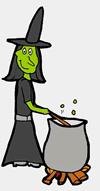


|


|
|
 
Witches in ancient Egypt would use their wisdom and knowledge of amulets, spells, formulas, and figures to bend the cosmic powers to his purpose or that of his clients. The Greeks have their own form of magic known as Theurgy which was close to religion. Another lower form of magic was mageia which was close to sorcery. They were individuals who claim to have knowledge and powers to help their clients and harm their clients’ enemies by performing rites or supplying certain formulas. The Romans were not suppose to practice sorcery as it was opposed to the public rites connected with religion, and was viewed as a threat to society. Any one seen or heard saying spells was arrested, tortured and executed. Imbolc or Imbolg is held on the 2nd February and is one of the "Greater Sabbats" of the Wiccan year, it celebrates the coming of spring and the recovery of the Earth Goddess after giving birth to the Sun God at Yule. The Sabbats or Sabbaths take place 4 times a year, February 2, April 30, July 31, and October 31. In ancient days, they were huge get-togethers that involved dancing, singing, and feasting which went on all night. It revolves around the change of seasons and the breeding of animals; they served as thanks for the bounties of earth. Other names given for Imbolc including the Feast of Pan, Feast of Torches, Feast of Waxing Lights, and Oimeic.
   
 Halloween
   
 Please read our Legal Statement and Privacy Policy.
|